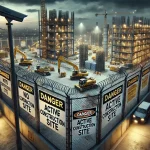Artificial intelligence (AI) is transforming industries worldwide, and construction is no exception. Traditionally slow to adopt new technologies, the construction sector now embraces AI as a powerful tool to revolutionize processes, enhance efficiency, and improve safety. From project management to design, from safety and live video monitoring to remote site security, AI’s impact on construction is reshaping how projects are planned, executed, and delivered.
AI’s Expanding Role in Construction
AI’s presence in the construction industry is growing rapidly, offering solutions to some of the most persistent challenges. The technology is being deployed in various capacities, ranging from automating repetitive tasks to predicting potential project delays. While many industries are reaping the benefits of AI, construction is seeing particularly significant advancements.
AI’s primary benefit lies in its ability to handle large amounts of data and generate insights that humans may miss. By analyzing previous project data, predicting potential bottlenecks, and optimizing workflows, AI allows construction professionals to make more informed decisions. The result is smarter project execution that enhances productivity, minimizes delays, and reduces costs.
Project Management: Redefining Efficiency
One of the most promising applications of AI in construction is project management. Traditionally, construction management involves juggling multiple tasks and keeping projects on track. AI significantly reduces the complexity of these tasks by automating key processes, allowing managers to focus on more strategic decision-making.
AI helps streamline project workflows, assigning tasks to workers based on their roles, availability, and skill sets. This improves the efficiency of labor deployment and minimizes downtime. AI can also forecast project completion dates by analyzing historical data and current progress. It predicts how various factors, such as weather conditions or supply chain disruptions, could impact deadlines and budgets.
Additionally, AI-based project management platforms can track spending in real time, flagging any deviations from the budget and helping managers maintain tighter financial control. By integrating past project data with real-time information, AI-driven tools provide construction managers with the insights they need to optimize resource allocation and improve overall project outcomes.
Enhancing Training with AI and Virtual Reality
The combination of AI with virtual reality (VR) and augmented reality (AR) technologies opens new doors in training construction workers. Traditionally, workers have learned on the job, but this often leads to inefficiencies and safety risks. AI-powered simulations in VR environments allow workers to practice complex tasks in a controlled, risk-free setting before executing them in the real world.
AI-enhanced training programs can also provide instant feedback, helping workers to identify areas of improvement. By running multiple training scenarios, workers gain valuable experience without the risk of costly mistakes. This makes AI-based training an excellent tool for improving safety and overall skill levels in the workforce.
These immersive training programs also allow workers to familiarize themselves with a wide array of construction designs and tools. With AI’s ability to analyze and recall vast amounts of data, trainees can review previous projects and gain insights that help them execute tasks more effectively when they transition to actual job sites.
AI in Building Design: Precision and Innovation
AI’s influence extends into the building design process, particularly in architectural modeling and simulation. Using AI, designers, and architects can create advanced models that optimize resource use and identify potential design flaws before construction begins. AI-powered tools can analyze past designs to suggest new approaches, improving the final product’s quality while saving time and materials.
Computer-Aided Design (CAD) and Computer-Aided Manufacturing (CAM) programs that incorporate AI enhance designers’ ability to simulate different building scenarios and refine designs based on these models. The use of AI in design helps identify the most efficient use of resources and ensures structural soundness. It can automatically suggest improvements in the building plan to avoid errors that may arise from human oversight.
Moreover, AI simulations of how a building will perform under various environmental conditions, such as wind loads, earthquakes, or floods, enable better preparedness in the early design stages. This level of precision reduces the need for costly post-construction modifications, making construction projects more sustainable and financially viable.
AI in Construction Safety: A New Era of Risk Management
Safety remains one of the most critical issues in construction, with many jobs posing inherent risks. AI is now playing a pivotal role in addressing this challenge. One of the most significant contributions of AI is its ability to perform real-time risk assessment and predictive analysis, identifying potential safety hazards before they escalate into accidents.
By constantly monitoring construction sites, AI systems can detect violations of safety protocols, equipment malfunctions, and other dangers. Through the analysis of sensor data, AI can predict when machinery is likely to fail, allowing for preemptive maintenance. This predictive capability significantly reduces the risk of injury by ensuring that workers are not exposed to faulty equipment.
AI-powered safety tools can also monitor workers’ movements, ensuring that they wear proper safety gear and maintain a safe distance from hazardous areas. These real-time monitoring systems provide immediate feedback, alerting workers and supervisors to any risks before accidents occur.
In an industry where time pressures often lead to shortcuts, AI offers a solution that keeps safety front and center. By eliminating human error in risk detection and allowing proactive measures to be taken, AI helps create safer work environments that protect both workers and the project’s timeline.
AI in Building Inspections: Precision at Every Step
The accuracy and efficiency of building inspections have always been crucial to maintaining safety and project quality. AI is revolutionizing this process by enabling remote and automated inspections, significantly reducing the need for manual oversight. AI-powered drones and cameras now survey construction sites, capturing high-resolution images and video that are instantly analyzed to detect issues.
These AI tools can assess whether a site meets required standards and identify any inconsistencies between the plan and the structure in progress. They can even measure distances, angles, and materials more precisely than the human eye, providing a higher level of accuracy in building assessments. Additionally, AI’s ability to track progress in real time helps to keep projects on schedule, as any delays or problems are flagged immediately.
Through automation, inspections that once took days to complete are now executed in hours, cutting down the time spent on routine tasks while ensuring precision at every step of the project.
Remote Construction Site Security with AI
In addition to improving workflow and safety, AI enhances security on construction sites. Construction sites, often left unattended for long periods, are vulnerable to theft, vandalism, and trespassing. AI-based security systems offer a robust solution by automating surveillance and threat detection, significantly reducing the reliance on human guards.
AI systems can differentiate between human movement and non-threatening activity, allowing them to focus on real security risks. Once a potential threat is detected, the system triggers alerts that enable security teams to respond swiftly. AI’s ability to continuously learn and adapt means that these systems become more efficient at identifying suspicious activity over time, reducing false alarms and improving overall site security.
AI-based video monitoring systems can also provide evidence for investigations and help prevent future security breaches by analyzing patterns in criminal behavior. These advanced security solutions ensure that construction sites remain secure, even when human presence is limited.
The Future of AI in Construction
As the construction industry continues to adopt AI-driven technologies, the future looks bright. AI has the potential to reshape every facet of construction, from design to safety, project management to security. These technologies enable construction projects to be completed faster, more safely, and with greater precision.
Secure Your Construction Site with Live Patrol’s Advanced Live Video Monitoring
The construction industry faces unique security challenges, from theft and vandalism to unauthorized access. Live Patrol’s live video monitoring solutions provide a proactive approach to securing your site, offering real-time surveillance powered by cutting-edge AI technology. Our systems are designed to detect and deter any potential threats, giving you peace of mind while focusing on your building projects.
With Live Patrol, you gain access to top-tier AI-powered security tools that differentiate between legitimate and suspicious activity. Our live monitoring services ensure that every angle of your construction site is covered, helping to protect valuable assets, reduce losses, and maintain a safe environment. Our highly trained operators respond to threats in real time, preventing damage before it occurs.
Our services go beyond traditional security measures. You can remotely access video feeds 24/7, allowing for constant oversight of your property from any location. Clear monthly reporting and instant notifications will keep you informed of any irregularities, ensuring your site stays protected around the clock.
Choose Live Patrol’s advanced video monitoring system to enhance your site’s security and safeguard your investments. Contact us to customize a security plan that fits your site’s security needs.

